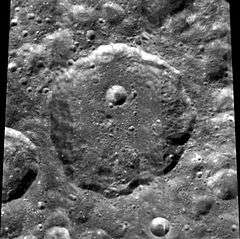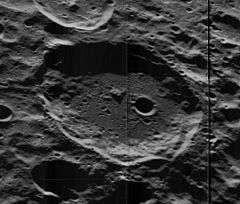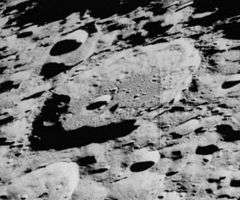Millikan (crater)
Millikan is a lunar impact crater in the northern hemisphere of the Moon's far side. It is located to the north of the crater H. G. Wells, and to the southwest of von Békésy.
 Clementine mosaic | |
| Coordinates | 46.8°N 121.5°E |
|---|---|
| Diameter | 98 km |
| Depth | Unknown |
| Colongitude | 240° at sunrise |
| Eponym | Robert A. Millikan |


The rim edge of Millikan is roughly circular and well-defined, but with some irregularities. There are some small outward bulges along the south and east where the edge has slumped inwards somewhat. The inner walls lacks a terrace structure that is seen, for example, in the smaller Cantor to the south. The interior floor of Millikan is relatively level, and there is a small, bowl-shaped crater to the north of the midpoint. Offset to the west of the middle is a low central peak. The floor is also marked by a number of tiny craterlets.
Satellite craters
By convention these features are identified on lunar maps by placing the letter on the side of the crater midpoint that is closest to Millikan.
| Millikan | Latitude | Longitude | Diameter |
|---|---|---|---|
| B | 49.8° N | 123.5° E | 21 km |
| J | 45.8° N | 124.6° E | 36 km |
| Q | 43.9° N | 118.6° E | 33 km |
| R | 46.0° N | 117.7° E | 49 km |
References
- Andersson, L. E.; Whitaker, E. A. (1982). NASA Catalogue of Lunar Nomenclature. NASA RP-1097.CS1 maint: ref=harv (link)
- Blue, Jennifer (July 25, 2007). "Gazetteer of Planetary Nomenclature". USGS. Retrieved 2007-08-05.CS1 maint: ref=harv (link)
- Bussey, B.; Spudis, P. (2004). The Clementine Atlas of the Moon. New York: Cambridge University Press. ISBN 978-0-521-81528-4.CS1 maint: ref=harv (link)
- Cocks, Elijah E.; Cocks, Josiah C. (1995). Who's Who on the Moon: A Biographical Dictionary of Lunar Nomenclature. Tudor Publishers. ISBN 978-0-936389-27-1.CS1 maint: ref=harv (link)
- McDowell, Jonathan (July 15, 2007). "Lunar Nomenclature". Jonathan's Space Report. Retrieved 2007-10-24.CS1 maint: ref=harv (link)
- Menzel, D. H.; Minnaert, M.; Levin, B.; Dollfus, A.; Bell, B. (1971). "Report on Lunar Nomenclature by the Working Group of Commission 17 of the IAU". Space Science Reviews. 12 (2): 136–186. Bibcode:1971SSRv...12..136M. doi:10.1007/BF00171763.CS1 maint: ref=harv (link)
- Moore, Patrick (2001). On the Moon. Sterling Publishing Co. ISBN 978-0-304-35469-6.CS1 maint: ref=harv (link)
- Price, Fred W. (1988). The Moon Observer's Handbook. Cambridge University Press. ISBN 978-0-521-33500-3.CS1 maint: ref=harv (link)
- Rükl, Antonín (1990). Atlas of the Moon. Kalmbach Books. ISBN 978-0-913135-17-4.CS1 maint: ref=harv (link)
- Webb, Rev. T. W. (1962). Celestial Objects for Common Telescopes (6th revised ed.). Dover. ISBN 978-0-486-20917-3.CS1 maint: ref=harv (link)
- Whitaker, Ewen A. (1999). Mapping and Naming the Moon. Cambridge University Press. ISBN 978-0-521-62248-6.CS1 maint: ref=harv (link)
- Wlasuk, Peter T. (2000). Observing the Moon. Springer. ISBN 978-1-85233-193-1.CS1 maint: ref=harv (link)